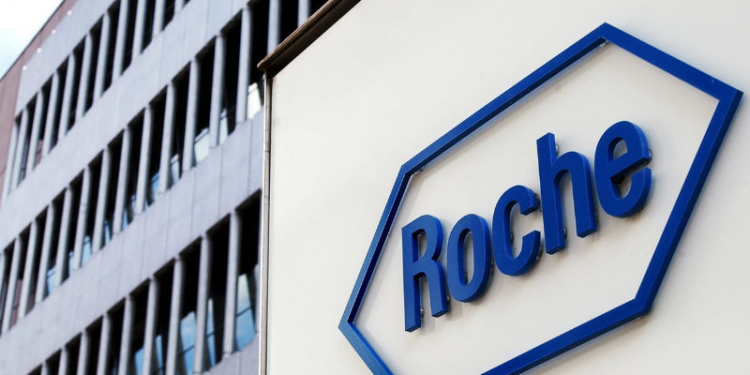The FINANCIAL — Commenting on the Group’s results, Roche CEO Severin Schwan said: «We have started the year with good growth in both our Pharmaceuticals and Diagnostics Divisions and with important positive clinical study results. A highlight of the first quarter was the US approval of our medicine Ocrevus for the treatment of multiple sclerosis (MS). Ocrevus is the first and only FDA approved medicine for both relapsing and primary progressive forms of MS and represents a new era for the treatment of this disease. We are well on track to meet our full-year targets.»
Group results
Good sales growth in both divisions
Group sales rose 4% to CHF 12.9 billion. Sales in the Pharmaceuticals Division increased 3% to CHF 10.2 billion, driven by very good early uptake of Tecentriq and continued strong growth of Perjeta and partially offset by lower sales of Tamiflu. In the US, sales advanced 6%, led by the recently launched medicines Tecentriq and Alecensa, as well as Xolair and MabThera/Rituxan. Sales of Tamiflu declined due to competition from generics. In Europe (+1%), Perjeta, Actemra/RoActemra and Herceptin were the main contributors to sales growth. In the International region, sales advanced 1%, led by the Latin America and Asia–Pacific subregions. In Japan (-2%), sales were impacted by government price reductions in April 2016.
Diagnostics Division sales increased 6% to CHF 2.8 billion. Centralised and Point of Care Solutions2 was the main contributor, led by the growth of its immunodiagnostics business (+13%). In regional terms, growth was driven in particular by Asia–Pacific (+13%) and Latin America (+21%). In EMEA3 (+2%) and Japan (+4%), sales increases were led by Centralised and Point of Care Solutions, and in North America (+4%) by Tissue Diagnostics, according to Roche.
Important new product approvals in Pharmaceuticals
The US Food and Drug Administration (FDA) approved Ocrevus for the treatment of two forms of multiple sclerosis (MS); relapsing MS (RMS) and primary progressive MS (PPMS). Ocrevus is an important new treatment option for people with RMS, and due to the favourable benefit-risk profile has the potential to change disease course. It is also the first and only medicine approved to treat PPMS, a particularly disabling form of MS. Multiple sclerosis, for which there is currently no cure,4 is a chronic disease that affects an estimated 2.3 million people around the world. The European Commission granted Alecensa a conditional marketing authorisation as monotherapy for adult patients with ALK5-positive advanced non-small cell lung cancer (NSCLC) previously treated with crizotinib.
Clinical trial results support key new indications for Roche medicines
Roche communicated important clinical results in the first quarter of 2017. The phase III Aphinity study with Roche’s Perjeta regimen met its primary endpoint. It showed that adjuvant (after surgery) treatment with the combination of Perjeta, Herceptin and chemotherapy achieved a statistically significant reduction in the risk of recurrence of invasive disease or death in people with HER2-positive early breast cancer compared with Herceptin and chemotherapy alone. Encouraging results from the Tecentriq phase II study IMmotion 150 were presented: the study compared Tecentriq plus Avastin as well as Tecentriq monotherapy to the treatment with sunitinib in people with previously untreated, locally advanced or metastatic renal cell carcinoma.
The phase III Alur study met its primary endpoint, showing that Alecensa significantly improved progression-free survival (PFS) in people with ALK-positive advanced NSCLC who had progressed following treatment with platinum-based chemotherapy and crizotinib, compared with chemotherapy. In addition, in early April Roche announced that the phase III Alex study met its primary endpoint, showing that Alecensa as initial (first-line) treatment significantly improved PFS compared with crizotinib in people with ALK-positive NSCLC.
The US FDA accepted Roche’s supplemental Biologics License Application and granted priority review for Actemra/RoActemra for giant cell arteritis (GCA), a form of vasculitis. The FDA also granted breakthrough therapy designation for MabThera/Rituxan, in pemphigus vulgaris, a rare skin disease.
New generation of diagnostics products
The cobas HPV DNA test for cobas 6800/8800 systems was launched in the EU and other markets accepting the CE-mark, and the US FDA cleared the CINtec Histology test to aid in the diagnosis of cervical pre-cancer. These tests are a key part of Roche’s cervical cancer prevention portfolio. Human papillomavirus (HPV) is the cause of almost all cases of cervical cancer, a leading cause of death in women.
The cobas Liat PCR system was launched in markets accepting the CE-mark. This real-time PCR system covers four assays, including a test for the rapid detection of Clostridium difficile. Timely and accurate diagnosis of this infection is important because it can quickly become life-threatening. In the US, Roche launched the cobas e 801 module for high-volume immunology testing. The Accu-Chek Instant system for effortless, reliable and affordable blood glucose monitoring was introduced in various markets in the EU.
Outlook for 2017 confirmed
In 2017, Roche expects sales to grow low- to mid-single digit, at constant exchange rates. Core earnings per share are targeted to grow broadly in line with sales, at constant exchange rates. Roche expects to further increase its dividend in Swiss francs.

































Discussion about this post